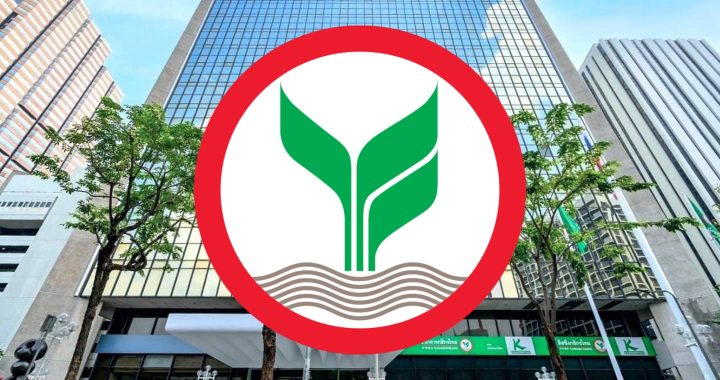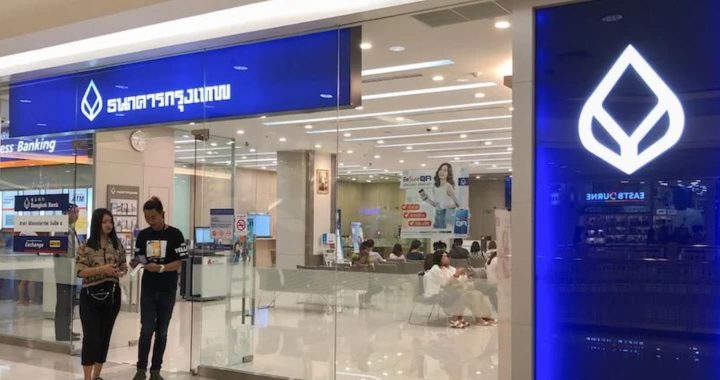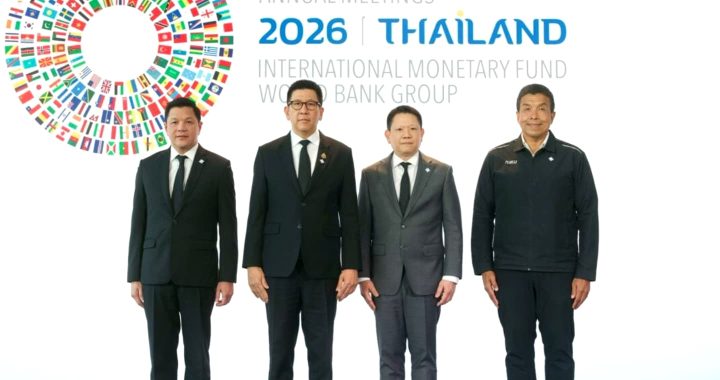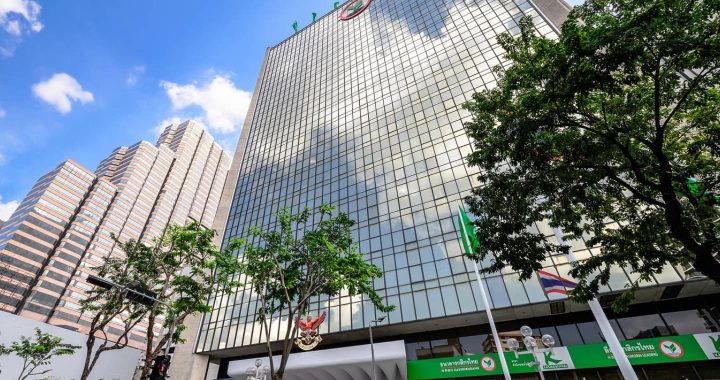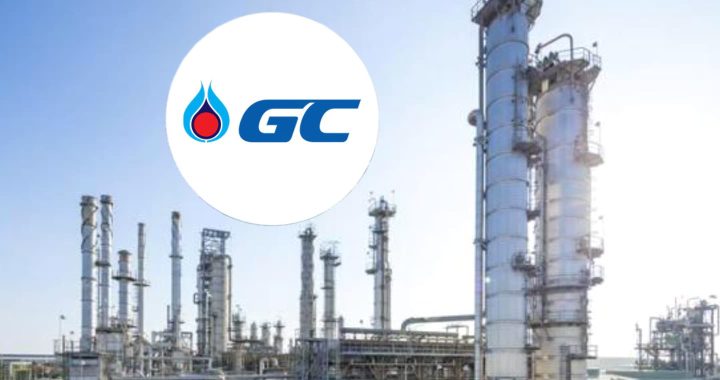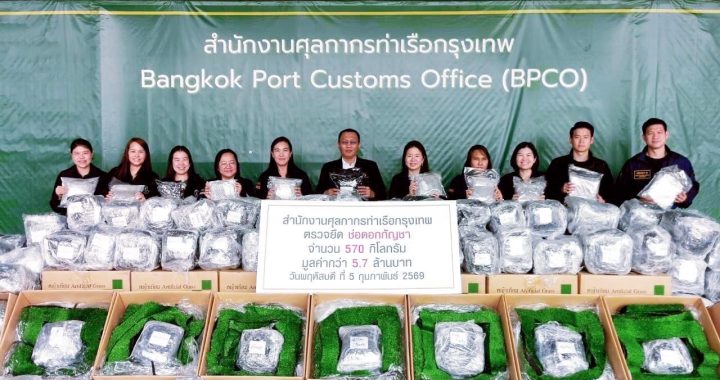KBank Private Banking recommends that investors consider carefully

KBank Private Banking (KPB) highlight three major trends in the real estate market as an investment guide for landlords and investors. Land use behaviors in the ‘new normal’ era are expected to affect property prices in the future. KPB holds the view that the government’s policy of not extending the land and building tax reduction in 2022 is likely to prompt high net worth individual clients to convert their land holdings into collateral and investment funds to gain potentially superior returns. KPB has targeted new Land Loan for Investment amount up to 10-15 billion Baht this year.

Ms. Korakoch Atthasakulchai, Chief – Non Capital Market Solution, Private Banking Group, KASIKORNBANK, noted, “The government’s decision to not renew the land and building tax reduction of 90 percent in 2022, which had been in place for the past two years, has triggered actions among landlords, especially owners of undeveloped lands. This is because that type of land cannot generate revenue streams to cover tax or other related expenses. Unless an effective plan is devised, holding land for speculative purposes or for passing wealth to children may cause negative cash flows due to several expenses that may be incurred. Landlords or real estate investors should carefully study market trends while seeking opportunities to enhance their land’s potential to generate attractive returns that could cover related expenses or even grow their existing assets.”
KBank Private Banking – a leader in real estate advisory service for high net worth individual (HNWI) clients – has identified three trends in the real estate market worth close watch this year as guidelines for landowners and investors, as follows.
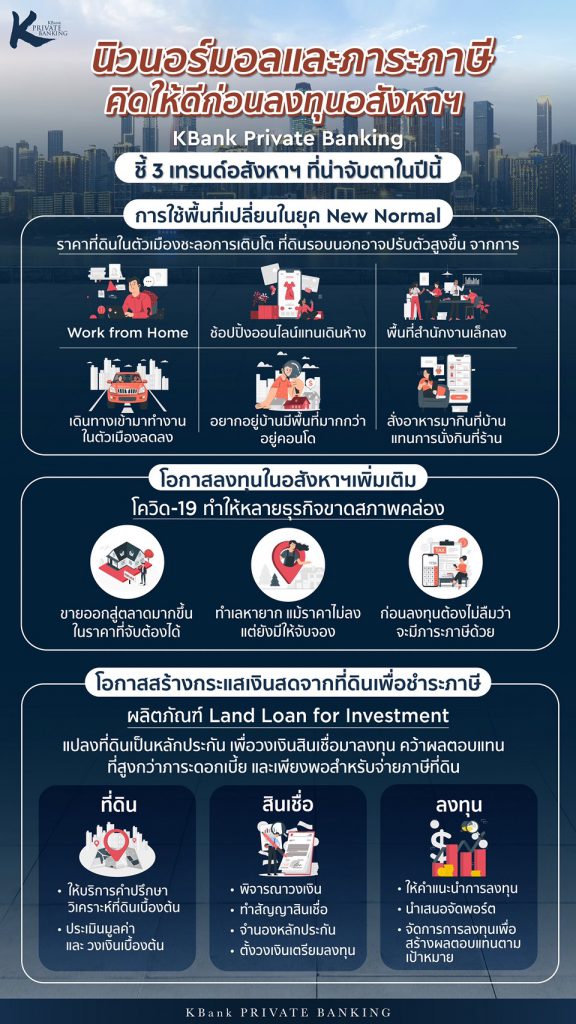
New ways of using land during the ‘new normal’ era: The COVID-19 pandemic has drastically changed the way we lead our lives. Work-from-home has become increasingly popular, and it is expected to be a mainstream work choice in the future. Given this, the number of people traveling to work in the city will decline, and this is bound to affect land utilization. For instance, people will likely prefer to live in homes that are more spacious than a condominium unit; office spaces may become smaller; online shopping will replace shopping malls; and consumers will also prefer to order food to eat at home rather than dining out. All of these factors will likely cause land prices in downtown areas to decline, while those in the outskirts of cities will likely increase. Aside from the location, another important factor is the potential of a piece of land, i.e., how it can be developed to meet the needs of consumers in today’s world.
More opportunities in property investment: As COVID-19 crisis has brought an immediate liquidity crunch to many businesses or forced them to adjust plans and strategies due to the new market environment, more assets than ever before, including properties, have been put up for sale at reasonable prices. Prospective buyers may also have a greater chance of owning the most sought-after properties in some prime areas, although their prices may not decline in certain locations. Therefore, this is a good time for investors who dislike volatility in the capital market and want to collect additional properties.However, one must bear in mind the potential tax burden before deciding to invest in the property market.
A Chance to convert land into investment funds in order to generate cash for land and building tax payment: As the land and building tax has become an additional burden after the government rescinded the 90-percent land tax reduction, and as the tax will likely be hiked by 0.3 percent every three years in line with the increase in land appraisal value, converting land into capital funds in order to seek returns for land tax payment via Land Loan for Investment is gaining interest from high net worth individual clients. Land Loan for Investment is the conversion of land into collateral and in return client will receive investment credit limit for an opportunity to gain returns. Investment options recommended by KBank Private Banking will generate higher returns than an interest payment burden and must be sufficient for land and building tax payment.
Ms. Korakoch added that, KBank Private Banking has teams of specialists who are ready to offer advice and facilitate the shift to Land Loan for Investment, ranging from tax and due interest calculation to capital allocation and investment management to achieve targeted returns via alternative investment products that can create revenue at a time when the market is moving in a narrow range. For instance, the knock-in knock-out (KIKO) structured note has an expected return of up to 8-12 percent p.a. This rate is higher than the average interest rates from Land Loan for Investment.In 2022, KBank Private Banking aims for its new Land Loan for Investment to reach 10-15 billion Baht. Currently, the accumulated portfolio amounts to 25 billion Baht, with a customer base of around 150 persons.
Ms. Korakoch concluded that, Investment in real estate is similar to investment in other assets, landowners and property developers should take several factors into consideration when deciding to pursue investment trends in the real estate market, as there are both attractive returns and risks. Therefore, Investors should study their potential investments thoroughly or consult professionals with regard to generating growth for existing assets and avoiding investment traps.



